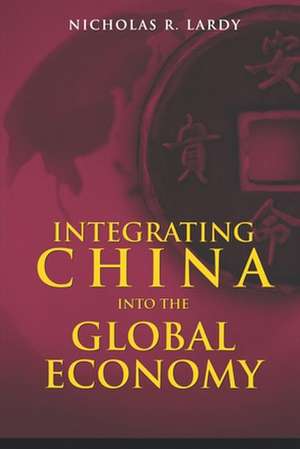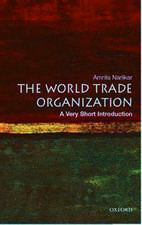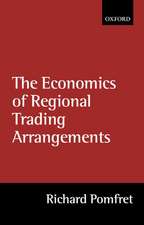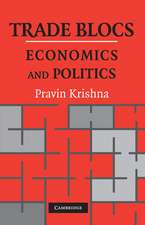Integrating China into the Global Economy
Autor Nicholas R. Lardyen Limba Engleză Paperback – dec 2001
China's accession to the World Trade Organization (WTO) has been hailed as the biggest coming-out party in the history of capitalism. Its membership eventually will contribute to higher standards of living for its citizens and increased growth for its economy. But why would the Chinese communist regime voluntarily agree to comply with the many complex rules of the global trading system since it has already become the world's seventh largest trading country while avoiding these constraints by remaining outside the system?
The answer to this question forms the basis for this new book. Nicholas Lardy explores the many pressures on the Chinese government, both external and internal, to comply with the standards of the rule-based international trading system. Lardy points out that, prior to entry into the WTO, China enjoyed high growth rates and more foreign direct investment than any other emerging economy. He draws on a wealth of scholarship and experience to explain how China's leadership expects to leverage the increased foreign competition inherent in its WTO commitments to accelerate its domestic economic reform program, leading to the shrinkage and transformation of inefficient, money-losing companies and hastening the development of a commercial credit culture in its banks. Lardy answers a number of other questions about China's new WTO membership, including its effects on bilateral trade with the United States; the possibility that China will use its power to reshape the WTO in the future; the degree to which the terms of China's entry were more or less demanding than those for other new members; the ability of China's economy to successfully open to new imports; and the prospects for new growth in various sectors of China's economy made possible by WTO accession. This book will become an important tool for those who wish to understand China's new role in the global trading system, to take advantage of the new opportunities for investment in China, or simply to gain a better understanding of what former President Clinton called a "once in a generation event."
The answer to this question forms the basis for this new book. Nicholas Lardy explores the many pressures on the Chinese government, both external and internal, to comply with the standards of the rule-based international trading system. Lardy points out that, prior to entry into the WTO, China enjoyed high growth rates and more foreign direct investment than any other emerging economy. He draws on a wealth of scholarship and experience to explain how China's leadership expects to leverage the increased foreign competition inherent in its WTO commitments to accelerate its domestic economic reform program, leading to the shrinkage and transformation of inefficient, money-losing companies and hastening the development of a commercial credit culture in its banks. Lardy answers a number of other questions about China's new WTO membership, including its effects on bilateral trade with the United States; the possibility that China will use its power to reshape the WTO in the future; the degree to which the terms of China's entry were more or less demanding than those for other new members; the ability of China's economy to successfully open to new imports; and the prospects for new growth in various sectors of China's economy made possible by WTO accession. This book will become an important tool for those who wish to understand China's new role in the global trading system, to take advantage of the new opportunities for investment in China, or simply to gain a better understanding of what former President Clinton called a "once in a generation event."
Preț: 215.99 lei
Nou
Puncte Express: 324
Preț estimativ în valută:
41.33€ • 43.30$ • 34.25£
41.33€ • 43.30$ • 34.25£
Carte tipărită la comandă
Livrare economică 09-23 aprilie
Preluare comenzi: 021 569.72.76
Specificații
ISBN-13: 9780815751359
ISBN-10: 0815751354
Pagini: 244
Ilustrații: bibliography, index
Dimensiuni: 152 x 229 x 17 mm
Greutate: 0.4 kg
Editura: Brookings Institution Press
Colecția Brookings Institution Press
Locul publicării:United States
ISBN-10: 0815751354
Pagini: 244
Ilustrații: bibliography, index
Dimensiuni: 152 x 229 x 17 mm
Greutate: 0.4 kg
Editura: Brookings Institution Press
Colecția Brookings Institution Press
Locul publicării:United States
Notă biografică
By Nicholas R. Lardy
Descriere
China's accession to the World Trade Organization (WTO) has been hailed as the biggest coming-out party in the history of capitalism. Its membership eventually will contribute to higher standards of living for its citizens and increased growth for its economy. But why would the Chinese communist regime voluntarily agree to comply with the many complex rules of the global trading system since it has already become the world's seventh largest trading country while avoiding these constraints by remaining outside the system?
The answer to this question forms the basis for this new book. Nicholas Lardy explores the many pressures on the Chinese government, both external and internal, to comply with the standards of the rule-based international trading system. Lardy points out that, prior to entry into the WTO, China enjoyed high growth rates and more foreign direct investment than any other emerging economy. He draws on a wealth of scholarship and experience to explain how China's leadership expects to leverage the increased foreign competition inherent in its WTO commitments to accelerate its domestic economic reform program, leading to the shrinkage and transformation of inefficient, money-losing companies and hastening the development of a commercial credit culture in its banks. Lardy answers a number of other questions about China's new WTO membership, including its effects on bilateral trade with the United States; the possibility that China will use its power to reshape the WTO in the future; the degree to which the terms of China's entry were more or less demanding than those for other new members; the ability of China's economy to successfully open to new imports; and the prospects for new growth in various sectors of China's economy made possible by WTO accession. This book will become an important tool for those who wish to understand China's new role in the global trading system, to take advantage of the new opportunities for investment in China
The answer to this question forms the basis for this new book. Nicholas Lardy explores the many pressures on the Chinese government, both external and internal, to comply with the standards of the rule-based international trading system. Lardy points out that, prior to entry into the WTO, China enjoyed high growth rates and more foreign direct investment than any other emerging economy. He draws on a wealth of scholarship and experience to explain how China's leadership expects to leverage the increased foreign competition inherent in its WTO commitments to accelerate its domestic economic reform program, leading to the shrinkage and transformation of inefficient, money-losing companies and hastening the development of a commercial credit culture in its banks. Lardy answers a number of other questions about China's new WTO membership, including its effects on bilateral trade with the United States; the possibility that China will use its power to reshape the WTO in the future; the degree to which the terms of China's entry were more or less demanding than those for other new members; the ability of China's economy to successfully open to new imports; and the prospects for new growth in various sectors of China's economy made possible by WTO accession. This book will become an important tool for those who wish to understand China's new role in the global trading system, to take advantage of the new opportunities for investment in China















